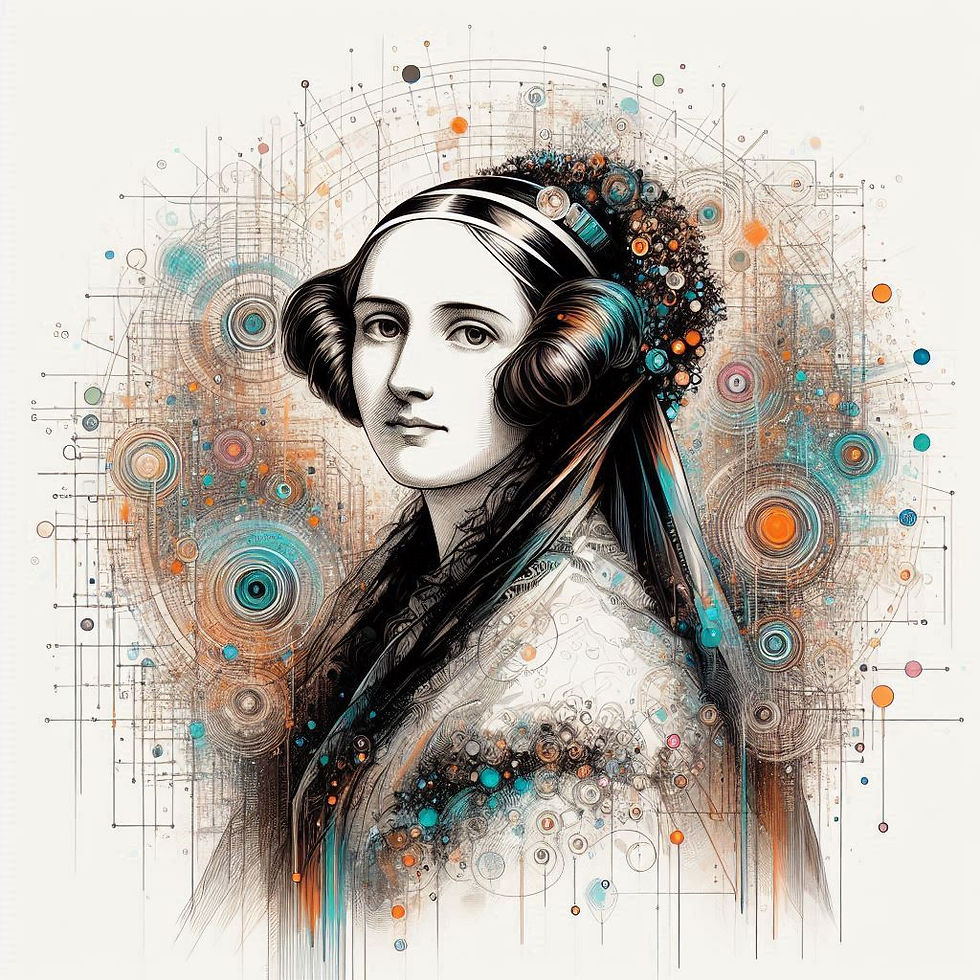
From Ada Lovelace to Today: Breaking Down the Gender Myths in Tech.
- Udu Ifeoma

- Nov 23, 2024
- 4 min read
Updated: May 6, 2025
Hey Guys,
Welcome back to another musing of mine on The Pop Radar!
Today, I’ll be talking about Ada Lovelace and her contributions to computer science, a misogynistic encounter with a tech bro, and insights from my guest tech writer, Caleb.
So, I’m currently enrolled in the IT Support course on Coursera (shout out to Coding Black Females UK and Google Career Certifications 💪). Anyways, the instructor starts talking about the history of the evolution of computers, and he gets to the Analytical Engine and mentions Ada Lovelace and her contribution to computer science for developing the first computer algorithm. Immediately, I’m transported to my undergrad days, where I’m engaged in this convo with a very "smart" gentleman 😂.
Our topic of discussion was about the gender pay gap in tech.
He said and i quote:
Why are women demanding more pay when they do not have passion for the field? Women only started showing interest in tech after the 2010s when they noticed there was money here.
So, I was like "Nah fam, you are capping! Remember Ada Lovelace and her first computer algorithm?"
And this dude goes:
That whole thing is just semantics.
Yes. Semantics!! 🙃
This got me thinking: what makes Ada Lovelace’s contributions so profound, and why do people still dismiss her legacy today?
Who Was Ada Lovelace?
Ada Lovelace, born Augusta Ada Byron, was the daughter of the famous poet Lord Byron. While her father wrote verses that brought people to tears, Ada was calculating equations that baffled everyone around her. Her brilliance landed her a partnership with Charles Babbage, the inventor of the Analytical Engine a prototype for the modern computer.

In 1843, Ada wrote what is now considered the world’s first computer algorithm, using her unparalleled imagination and mathematical skills to push boundaries no one else had even considered. She envisioned machines doing more than arithmetic; she foresaw their use in creating art, music, and beyond.
And yet, despite her trailblazing work, many dismiss her contributions because she wasn’t physically “coding” in the modern sense. But that’s like saying architects aren’t vital to building skyscrapers. Without Ada’s ideas, modern programming wouldn’t exist.
Introducing My Guest Writer: Caleb.
To shed more light on Ada’s legacy, I’ve invited a special guest writer to share his expertise. Caleb is a Blockchain and Fullstack Developer who’s passionate about tech innovations and loves diving deep into the intersection of history and technology. With his wealth of knowledge, he’s here to help us explore why Ada Lovelace deserves her flowers.
Let’s jump into his thoughts on Ada and how her legacy has shaped the world of tech.
Q1: Who exactly was Ada Lovelace, and why is she celebrated?
Caleb: Ada Lovelace, originally Augusta Ada Byron, was a brilliant mathematician and writer, daughter of the poet Lord Byron. She's celebrated because she worked with Charles Babbage on the Analytical Engine, a design for a mechanical computer. Ada didn’t just crunch numbers; she wrote what’s considered the first algorithm, earning her the title of the world’s first computer programmer.
In 1843, Ada wrote what we now consider the first-ever computer program. She created a set of instructions that could theoretically guide Babbage’s machine to perform calculations, even though the machine itself was never completed. Think of it as writing a recipe for a cake you’ve never seen, using only your imagination. Genius, right?
Q2: What set Ada apart from others in her time?
Caleb: Ada didn’t just see the Analytical Engine as a glorified calculator. She envisioned it doing so much more, like creating music, solving complex equations, and even generating art. This is what makes her a visionary. While others were stuck in the mindset of 'numbers-only,' Ada predicted a world of creative computing, basically foreshadowing everything from Spotify to Photoshop!
Q3: Why do you think Ada’s contributions are sometimes dismissed?
Caleb: It’s the age-old problem of downplaying women’s achievements. Ada’s work was revolutionary, but because she didn’t physically build a machine or 'code' in the way we think of today, critics often diminish her contributions as mere theory. But theory is where everything begins. Without her, there wouldn’t even be a foundation for modern programming to stand on.
Q4: What would you say to the tech bro who called her work 'semantics'?
Caleb: Man, the audacity! I’d say: 'If it weren’t for Ada, your so-called “passion” for tech wouldn’t even exist.' Her work proves that innovation starts with vision, not tools. Plus, Ada wrote her algorithm before computers were even a thing. She deserves every bit of recognition for that."
Final Thoughts.
Ada Lovelace’s story isn’t just about being the first programmer; it’s about defying expectations and proving that women have always had a place in tech. Dismissing her contributions as 'semantics' ignores the ground-breaking legacy she left behind.
So, to the tech bro from my undergrad days: Ada Lovelace didn’t just create the first algorithm; she inspired generations of innovators. And next time you enjoy a bug-free app or debug an error, take a moment to thank her. Without Ada, we wouldn’t even have a screen to yell at, Doofus!









Comments